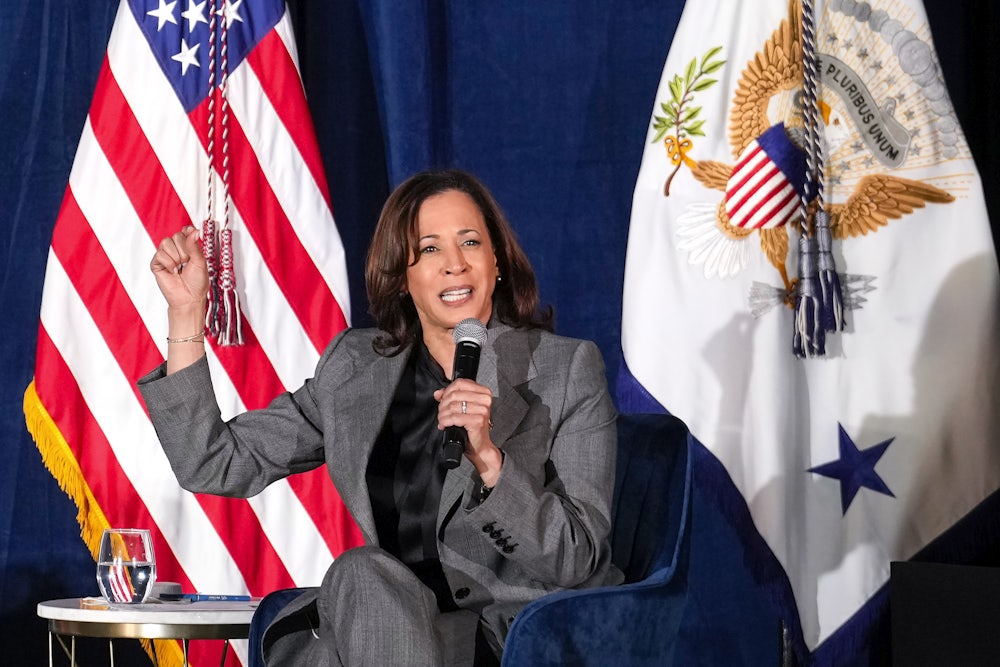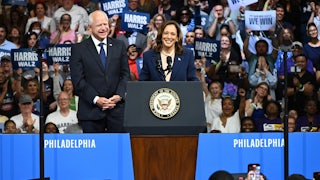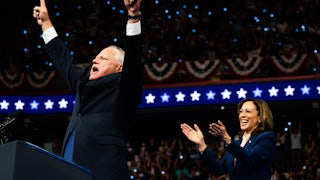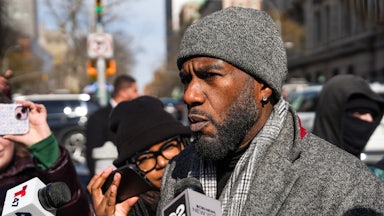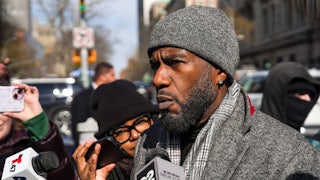Latino men for Kamala Harris had something to prove last week. An impromptu group of campaign donors calling themselves “White Dudes for Harris” had made waves, raising $4 million on a Zoom call featuring a suite of celebrities, including actor Jeff Bridges who famously played “The Dude” in the cult classic film The Big Lebowski. Just a week before, a group of around 4,500 Latinas for Harris had raised roughly $150,000 on a call. The time had come for Latino men to step up.
“I don’t want to wake up tomorrow and see on CNN how white boys outraised the Latino men, so we need to get into our wallets,” said Chuck Rocha, a former Bernie Sanders adviser who served as emcee for the “Latino Men for Harris” fundraiser.
The call—which included comedian George Lopez, Senators Ben Ray Luján and Alex Padilla, House Democratic conference chair Pete Aguilar, and Democratic National Committee Vice Chairman Henry Muñoz, among other male Latino political luminaries—raised around $70,000 from 2,600 call participants (735 of whom donated), far less than the other demographic fundraisers since Harris replaced Biden at the top of the Democratic presidential ticket.
“I would have handled it differently had I known it was a fundraising call,” said Muñoz, formerly the party’s finance chairman and owner of the comedy platform Funny or Die. “But behind every challenge there is an opportunity. I don’t think the first call was perfect. It could have been better. I think there’s still some explaining to do for Latino men to know who she is.”
The relatively underwhelming effort illustrated the ongoing challenge Harris and Democrats have engaging this demographic. They must recognize the diversity within Latino men, moving beyond stereotypes to address their unique concerns and aspirations, especially as Donald Trump has been making inroads with them, according to polls and political observers.
For years, Democrats believed that the country becoming browner and more ethnically diverse would automatically give them an advantage against Republicans, who, especially in the Trump era, utter racist bile. Recent elections disproved that notion as the GOP has performed better and better among Latinos.
Yes, a majority of Latino men will vote for Harris—no one doubts that. But the Trump campaign only needs to shave her margin among Latino males slightly to pave the way for a MAGA return to the White House. If Harris is to have any hope of winning, she will need to tailor her appeals specifically to the aspirations of Latino men, crafting narratives that resonate and speaking authentically to issues.
“We may have taken the subgroup of Latino males for granted in the past,” Muñoz conceded. One way Harris, specifically, can engage them, he told me, would be to highlight her record as California’s attorney general, specifically a 2015 policy to combat wage theft.
“This agreement allows our agencies to better investigate and prosecute those who exploit workers and deny them the pay and benefits they deserve,” Harris said at the time. Muñoz, who, along with his wife, Kaia Ferrari, is a longtime Hollywood fixer for Democratic campaigns, said that that narrative would appeal to Latino voters. “I hope we do an ad with that,” he said.
Latin celebrities could also draw men to her campaign. As Harris gains momentum, operatives expect that major Latino male celebrities like Bad Bunny, Pedro Pascal, and John Leguizamo will turn up for Harris on the trail. “Celebrities always help,” said Albert Morales, an ex-director of Latino political engagement at the Democratic National Committee, but only if the party has laid the groundwork.
To some extent at least, it has. Morales credits the Biden White House, especially political director Emmy Ruiz, who is close to Harris, with maintaining consistent and strong outreach even as the ticket has transitioned from Biden to Harris. “With Emmy, the cream really rises,” said Morales, now a pollster with a horse farm in Maryland. “She’s really been keeping the old coalition together and rebuilding it, especially with Latinos.”
Harris campaign manager Julie Chavez Rodriguez, granddaughter of California labor leader Cesar Chavez and a close aide to the vice president, also has deep roots in Latino organizing, having worked for the Obama, Biden, and both Harris campaigns for president.
But Democrats and the media have been duped by high-priced consultants and inaccurate pollsters in the past. Rocha, who emceed the “Latino Men for Harris” call, for example, was convicted in 2013 of embezzling money from the United Steelworkers. Others have simply failed to deliver. In 2016, Gary Segura and Matt Barreto led Latino Decisions, a boutique polling firm Democrats hired that failed to see Donald Trump’s rise in the demographic. As late as October, Latino Decisions polling showed support for Trump at 14 percent. In the end, Trump more than doubled that figure, winning 29 percent of Latino voters, according to exit polls.
Segura and Barreto have since left Latino Decisions, forming a new Democratic firm, BSP Research. Barreto now works for the Harris campaign. Segura polls for the Harris Victory Fund, and recently he was commissioned by the voter engagement group Somos PAC to conduct a poll—which drew widespread media attention, starting with a scoop by TNR’s Greg Sargent on Monday—showing Harris opening a substantial lead over Trump among Latinos.
Then there’s Trump himself, whose gains with Latino men have come despite his own chronic clumsiness with Latinos. “We need to help them articulate why what we are doing is important to specific Latino audiences,” Muñoz said of Harris and the Democrats, contrasting them with Trump’s own behavior. “Look at how Trump treated the Puerto Rican community in the aftermath of Hurricane Maria.” In 2017, the Trump administration withheld $20 billion in aid to the island after one of the deadliest natural disasters in U.S. history, then obstructed an investigation into why the money was denied. The ex-president famously tossed rolls of paper towels to hurricane survivors at a relief center, a spectacle San Juan Mayor Carmen Yulín Cruz called “terrible and abominable.”
Just this week, Trump seemed to mistake Venezuela for El Salvador during a Tuesday interview with right-wing streamer Adin Ross. “If you look at Caracas, it was known for being a very dangerous city, and now it’s very safe. In fact, the next interview we’ll do … in Caracas, Venezuela, because it’s safer than many of our cities,” the ex-president said.
But Venezuela is in the midst of violent political turmoil since opposition leaders accused Nicolás Maduro of stealing their latest presidential election. Trump was presumably thinking of El Salvador, where President Nayib Bukele, a MAGA darling, has been widely credited with cleaning up his country’s gang-violence epidemic—through mass incarceration policies opponents say have suspended human rights in the nation.
And not for nothing, most of the mass deportations Trump promises to carry out if he wins the White House will surely be of, well … Latino men, the group most likely to have crossed the border illegally in the last decade.
Still, despite being the proverbial whipping boys of the MAGA movement, dozens of Latinos were among the Trump mob that stormed the Capitol on January 6, 2021. That November, Biden had won Latinos 59–38, winning Latinas by 44 points and Latino men by 23. This was 17 points lower than Hillary Clinton when she won Latinos 66–28 in 2016: Latino men by 31 points and Latinas by 44 points.
As journalist Eric Garcia noted in a 2021 Washington Post op-ed about Trump’s attraction for Latino men, state-level exit polls showed a wide Latino gender gap. Trump won Latino men by 20 points in North Carolina but lost Latinas by 54 points. Latinas favored Biden by 47 points in Nevada, where he won Latino men by only six points.
That was 2020. Fast-forward to July 17 of this year, when the most recent Pew Research survey found that “equal shares of Latino registered voters say they would vote for Biden and Trump in the 2024 election. Roughly a third of Latino voters (36%) say they would vote for or lean toward each of the candidates if the election were held today.” Pew found that nearly a quarter of Latino registered voters supported Robert F. Kennedy Jr.’s independent run for president, another x-factor that should make Harris and her new running mate, Minnesota Governor Tim Walz, nervous.
Unfortunately for Democrats, there’s no simple answer to Trump’s appeal with Latino men. Lincoln Project co-founder Mike Madrid, who co-hosts (along with Rocha) the Latino Vote podcast, notes that Latino men are “the fastest growing non-college blue-collar workers” in America. “That’s one of his best demographics,” Madrid said of Trump. He continued: “They’re also third, and now fourth, generation so they don’t identify nearly as strongly with the racial identity messaging Democrats use to appeal to first-generation and immigrant Latinos.”
Cristóbal Alex, who headed the Latino Victory Fund before serving as deputy Cabinet secretary in the Biden administration, said Latino men are drawn to MAGA by “a false belief that Trump is a successful businessman and therefore good for the economy … all of which is bullshit. He’s a fraud who was born rich.” Far from being self-made, Trump received at least $413 million from his father over the years, adjusted for inflation. Muñoz also noted that machismo plays a part in Trump’s appeal to Latino men. “His appeal is built on a cult of personality for a lot of men that is not reality—and certainly not our reality,” he told me.
“There’s a positive and a negative side to machismo,” Muñoz clarified. “Machismo is strength and pride and standing up for yourself and your family—but the way he treats and talks about women is toxic machismo, and that’s not us. There’s a big difference between our tradition of machismo and the toxic machismo he employs against us.”
For his part, Madrid disagrees. “The machismo trope is lazy, racist, and false,” he told me. “The Latino Trump men are the least likely to identify or prioritize their Latino identity, so how can that be machismo? The Latino men most likely to support female and nonwhite candidates are the most likely to have strong Latino identity.”
Madrid argues that the perceived shift among Latinos isn’t really a shift at all. “It’s an emergence of a new type of voter that’s defying the stereotype of what a ‘minority’ voter is,” he said, adding: “Older Latinos haven’t changed and become more Trumpy or conservative. This new voter is much younger, third-generation, English-exclusive, and has weak party ties. This is where Trump is growing his Latino support.”
As November’s election looms closer, the spotlight on Latino voters will only intensify. The Harris campaign, with its deep (and deepening) Latino roots, is poised to leverage personal connections and policy successes to appeal to this critical voting bloc. The road ahead will be challenging, however, with Trump’s influence among some Latino men still evident.
Ultimately, the battle for Latino men’s votes is not just about fundraising numbers but about building genuine connections and trust. The success of the Harris campaign in engaging Latino men will likely be a determining factor in who occupies the Oval Office in January.
